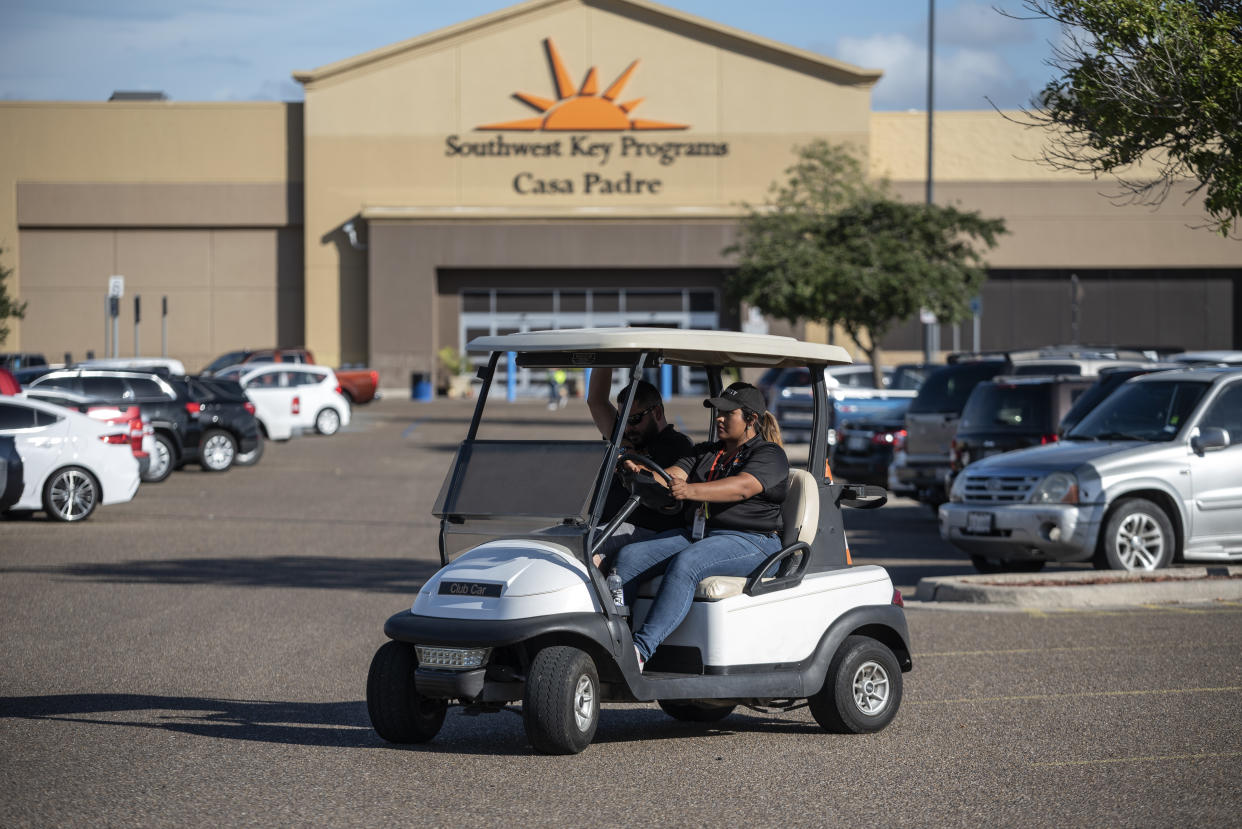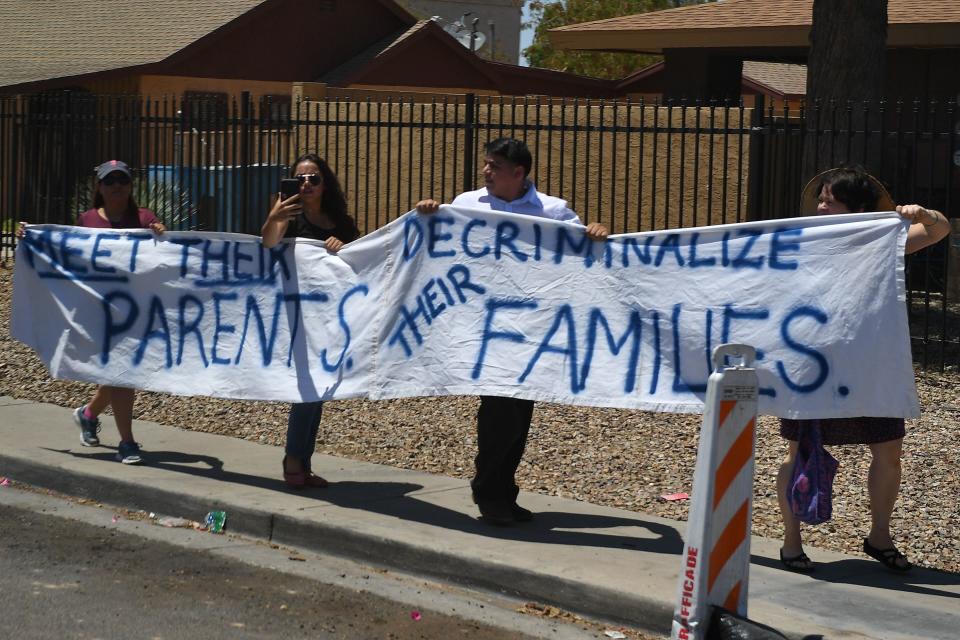Here's What School Is Really Like For Some Migrant Children Separated From Their Parents

Serious challenges, including a lack of experienced teachers, may be undermining the federal government’s efforts to educate undocumented children in its care, according to five former employees of Southwest Key Programs, a nonprofit network of shelters the government pays to take care of migrant children.
Although many teachers and staff at Southwest Key facilities deeply care about the kids, it’s not clear how much students are learning, and teachers sometimes serve more as babysitters than educators, the ex-employees said.
Southwest Key shelters thousands of unaccompanied immigrant children on behalf of the federal government until they are released to a sponsor, such as a relative. The government, which is legally required to educate undocumented kids, requires organizations like Southwest Key to provide the children with at least six hours of age-appropriate education a day, Monday to Friday, in basic academic areas like science, math and reading.
Like many other shelter organizations, Southwest Key has witnessed an influx of children in recent months as the Trump administration’s zero-tolerance policy on illegal border crossings led to thousands of children being separated from their families.
But at a Southwest Key shelter for migrant children in Channelview, Texas, teachers acted almost like a cross between prison guards and babysitters, said Julie Minerbo, who worked as a therapist at the center in February and March 2018. Minerbo was terminated after managers said her Spanish was inadequate — a claim she disputes.
Minerbo and the other former employees cited in this article didn’t have access to curriculums. But they witnessed students of all ages sitting in the same classrooms together. They often seemed to be lacking books or materials, with a teacher serving to make sure no one hurt themselves or ran away, she said.
“It never really seemed like there was much education,” Minerbo added.
A spokesman for Southwest Key directed all questions to the Department of Health and Human Services, which did not reply to HuffPost’s request for comment.
Southwest Key emphasizes that its shelters are not detention centers. Children are also only supposed to live in government-funded shelters for relatively brief periods of time before being reunited with family members. (The average length of stay for an unaccompanied minor in the program is about 57 days, the government says.)
Salvador Cavazos, Southwest Key’s vice president over education services, said that details of their education services are proprietary information, according to the Dallas Morning News. Southwest Key and HHS did not tell HuffPost why a publicly funded education service is proprietary.
It’s also not yet clear how the influx of kids under the zero-tolerance policy will affect education services. Overall, Juan Sanchez, president and CEO of Southwest Key, told NPR last month that they were “caught off guard by it ramping up so quickly. And we’ve hired now all the staff we need, but it took us a while to be able to do that.”
Migrant shelters are complex and challenging educational environments. Children come in with different education levels, and many have dropped out of school at a young age or been unable to safely attend schools in their home countries, said Fátima Menéndez, legislative attorney with the Mexican-American Legal Defense and Education Fund.
Many of the migrant children Menéndez saw when working for another organization were far behind their U.S. counterparts in school, she said, and may have had limited access to education in their home countries. Children may also speak indigenous languages other than Spanish that require specific instruction and spend varying amounts of time at the shelters before they are released. And they may arrive at the shelters deeply traumatized by their journeys across the border.

Staff members might not know whether a child would be in the facility for 15 days or 12 months before being placed with a sponsor, explained Irma Gonzalez, who worked as an assistant lead case manager for Southwest Key in Texas from January to May 2017. Gonzalez wasn’t privy to individual lesson plans. Staff intentions were good, she felt, but she nonetheless saw kids “just sitting there coloring, the teacher standing there babysitting.”
Teachers are “really trying” and “working hard,” but they don’t have resources, echoed Antar Davidson, who was a youth care worker at the Estrella del Norte shelter in Tucson, Arizona, before quitting earlier last month. “The kids barely learn anything; they’re watching number videos, listening to reggaeton and coloring,” Davidson said.
This environment would be a challenge for any teacher, but according to some former staffers, Southwest Key only required minimal experience in education.
A Southwest Key job posting for a teacher in Phoenix asks that candidates be least 21, have a bachelor’s degree in education or a related field, and 1-2 years of paid or unpaid experience working with youth. Teachers are expected to maintain a grade book and implement daily instruction in “all core subject areas,” including ESL, physical education and vocational courses. A posting for a lead teacher in Houston, Texas requires a combination of a bachelor’s degree with a state certificate, or a master’s degree.
Public school teachers in Texas, by comparison, are required to have a bachelor’s degree, to complete an approved teacher preparation program involving experience in the classroom and to pass teacher certification exams. In Arizona, a bachelor’s degree is also required to be a secondary school teacher, along with completion of a teacher preparation program or 30 semester-hours of education courses and a specific license. At the same time, both states are currently suffering from teacher shortages.
A Southwest Key spokesman told ProPublica the nonprofit has “rigorous hiring standards” and that staffers undergo a minimum of 80 hours of classroom and on-the-job training before they can supervise a child, with additional mandatory training each year.
Jose Elias Martinez was hired for a teaching job in a Southwest Key shelter in June. He studied engineering in college and spent some time tutoring younger kids and college students, but had never formally worked as a teacher before getting hired at Casa Phoenix, he told HuffPost. He had to leave the job after several weeks of training because his background check raised red flags. He is still hoping to return to a Southwest Key classroom.
“I was kind of going through a job transition,” said Martinez, 27, who learned about the job through a LinkedIn advertisement. “I was intrigued by the fact that it was all over the news.”
Outside of the classrooms, too, students moved in a highly restricted environment that seemed like a mix of high school and prison culture, Martinez said. Other staff members had described it in a similar way.
Southwest Key would take kids on field trips and celebrate holidays, Gonzalez said. Job postings say there are activities for Cesar Chavez Day and the Fourth of July, and that there are visits to museums and a water conservation center.
At BCFS Health and Human Services, another nonprofit, kids could decorate a Christmas tree and receive little presents, recalled Gonzalez, who previously worked for the group in Harlingen, Texas. But she noted that staffers were “very careful not to give them anything that could be turned into a weapon.”
House Democrats sent a letter to Trump administration officials last week seeking additional information on how the government is ensuring that educational standards for unaccompanied minors are being met, and about the credentials and experience of teachers. They requested a response by Friday.
Love HuffPost? Become a founding member of HuffPost Plus today.
This article originally appeared on HuffPost.

